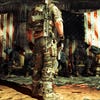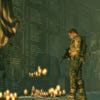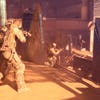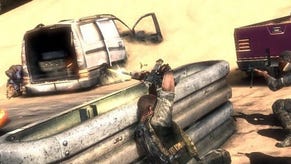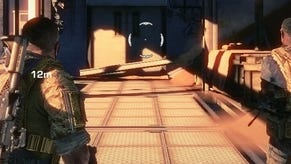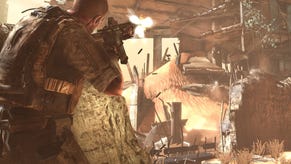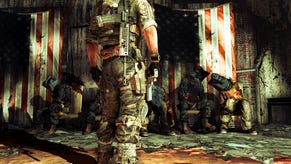Spec Ops: The Line Preview: A Shock Shooter
2K channels BioShock in its thoughtful third-person action game.
2K's Spec Ops: The Line is riddled with conflict and contradictions. It's partly about the culture clash that's played out across the dunes of Dubai as the Middle East crashes violently into the consumerism of the West - a parable told in the tidal waves of sand that splash up against the city's shards of concrete and glass in the game's near-future vision.
But there's another, more curious conflict at Spec Ops' own dark heart. Here's a tale of the dehumanising horror of war, its story leaning heavily on Conrad (and a little awkwardly too, with its Kurtz-inspired character clumsily renamed Konrad). And at the same time, here's a game about the simple pleasures of slamming your shoulder into a wall before lining up headshot after headshot after headshot, in combat that's physical, muscular and entertaining.
Can 2K and developers Yager Development have their cake and eat it, providing a moral tale and a meaty shooter all at once? A tour through a handful of Spec Ops' campaign missions doesn't present a comprehensive answer, but it does give a glimpse of a game that, with its own internal conflict, promises to be more interesting than many of its peers.
It's the setting that first alerts you to Spec Ops: The Line's slightly skewed take on the third-person shooter. Yager and 2K have revelled in the perversity of Dubai, sending you from seven-tiered shopping malls to diamond-encrusted hotel lobbies and through to burnt-out traffic jams where dead Bentleys and SUVs provide cover for the firefight.
"It's a fantastical place," writer Walt Williams says of Spec Ops' location. "There are a lot of parts of our Dubai that are real, and there are some that we've made up - but I find myself getting confused between the two. In the research into the place, you find out there's an actual 17th-century European town that a guy had recreated in the city. It's a weird place, and you get such a strange juxtaposition of these worlds and these cultures coming together."
For a writer, such a richly surreal backdrop must be manna. And for Walt Williams, it's a chance to work a location into a game's very fabric - a feat that he's witnessed before, having been at 2K as Ken Levine brought Rapture to life and as 2K Marin breathed a new kind of life into the destroyed utopia. Spec Ops: The Line is his first lead project, but he's served one hell of an apprenticeship.
"I learnt a lot watching Ken Levine, and watching him work on BioShock helped," says Williams. "I started work on Spec Ops immediately after that project finished, and learnt about having the courage and the gusto to have a vision and go with it."
A first glimpse at Spec Ops: The Line admittedly reveals little of that gusto, vision or ambition. You play as Martin Walker, a character who's as nondescript as they come: with close-cropped hair, heavy stubble and the voice of Nolan North, he's the archetypal video game soldier. He finds himself in what seems like the archetypal military shooter, too. The shooting's competent if a little pedestrian, the slow war of attrition enlivened somewhat by limiting you to two weapons at a time, while it's all served by cover mechanics that come with a pleasing sense of weight.
You're accompanied by teammates whom it would be cruel to label dumb, but generous to accuse of having smarts. They never frustrate - which is high praise when it comes to AI squad-mates - and can be directed through use of a single context-sensitive command that's a little erratic in its implementation.
Enemies, on the other hand, are relentless and seem a little more devious than their counterparts, working around cover and constantly threatening to overwhelm you. They go down easy - and crumple pleasingly when shot - making up for their weakness through their sheer numbers. Spec Ops: The Line boasts a body-count that would make Rambo green with envy to the point where it threatens to become wearisome.
But, like BioShock, Spec Ops: The Line doesn't seem to be allowing run-of-the-mill mechanics to hold back its ambition - and indeed, like BioShock, it strives to embrace them. Whereas Irrational's game sent up the heavy hand-holding of some first-person games, then Spec Ops looks to send up the relentless, often characterless violence of the third-person shooter.
"In a lot of ways, I wanted people to have a look and ask why is it fun to shoot things," Williams says. "When you look at how we view guns and war as a civilised society, why is it so much fun to simulate it ourselves in our living room? What is this difference between these two schools of thought that we have about violence and war?"
"It's a difficult thing to do - to make a game that's fun but makes you feel guilty about playing it. We're certainly not saying that playing a game like this is bad, and that you're bad for enjoying it. But by making it fun and by also making that question, that hopefully makes the player think about his actions."
Spec Ops' more moral leanings become clear as its hero, Walker, moves further and further away from the standard heroic template, becoming more steely-eyed, more brutal and more blasé about the horror that surrounds him. And he does this in your own hands, making you totally complicit in his descent into darkness.
"We're an interesting medium," Williams says. "We're the only one where you can literally put on someone else's shoes and live through a situation with them. What I wanted to do with Spec Ops is create a situation where at the end of it, it held a mirror up to you, and you're able to think about how you felt and the choices that you made. I think that, while videogames are still fun, they're also the only medium that... may be able to make us more empathic, whereas movies can be more voyeuristic."
One moment late on in the demo sees this mirror being held up, both literally and figuratively. It's a take on Modern Warfare's now well-worn AC130 section, although it quickly mutates into something more akin to another of Infinity Ward's more notorious moments. Walker is presented with a remote turret that can fire off rounds of white phosphorous, and before him is a slim valley that's seemingly awash with enemies. And so he lets rip, the camera switching to the familiar monochrome display that, in a chillingly effective touch, reflects the cold, staring face of Walker as kill after kill is confirmed. Minutes later you walk through the aftermath of your actions, picking through the destruction before being presented with a grisly and harrowing twist.
"I think we'll probably get compared to [No Russian]," admits Williams of a section that's sure to attract interest, "and I think perhaps a little unfairly. There was a bit of crassness to that, and the crassness came from it being skippable. It was exploitative, and it was skippable because it was disturbing.
"I think if you want to do something like that, and you want to use that kind of narrative moment to create an emotional reaction in someone, you have to commit to it. You can't back halfway out of it - then what's the point of doing it? Why do you have it in there? If it makes you uncomfortable then just don't have it in there. It didn't necessarily add anything, with the exception of controversy."
Spec Ops will likely prove controversial too, but it's heartening to see a game that looks beyond the shock tactics of other shooters that have a tendency to leave a nasty taste in the mouth. With its action backed up by a more philosophical outlook, 2K and Yager Development could provide something that, while hardly pleasant, is certainly more palatable.




